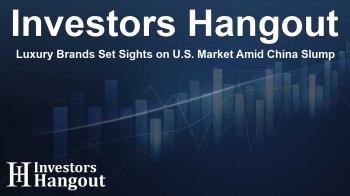Luxury Brands Set Sights on U.S. Market Amid China Slump

Luxury Brands Turn to U.S. Consumers
As the luxury goods market continues to face challenges, major brands are shifting their focus towards U.S. consumers in response to ongoing weaknesses in China. With expectations for an increased appetite for luxury items in the U.S., these companies are eager to entice shoppers with elegant offerings.
Strong Market Potential in the U.S.
Luxury brands such as LVMH and Kering are attempting to tap into the affluence generated by a robust stock market and the increasing popularity of cryptocurrencies among American consumers. This shift reflects a strategic pivot in response to the decline in spending from their traditionally strong market in China.
Consumer Spending Trends
Recent data shows a positive trend in U.S. credit card spending on luxury brands with a year-on-year increase of 1% recorded last December. This marks a significant turnaround, marking the first increase in over two years, driven largely by sales of leather goods and clothing.
Challenges in the Global Luxury Market
The global luxury market, valued at approximately 363 billion euros, has been grappling with slower sales as outside economic factors impact consumer behavior. China's ongoing property crisis and its sluggish economy have led to a decreased demand for high-end fashion, while European buyers are also curbing their spending due to rising living costs.
Industry Forecasts and Reactions
The luxury sector has experienced substantial volatility in stock performance, especially since the post-pandemic spending boom has diminished. LVMH, a dominant player in this space, reported a staggering loss in market value, exceeding 30 billion euros over the recent months.
Recovery Efforts and Market Insights
With last year's sales anticipated to be among the lowest on record—with estimates indicating a 2% decline—luxury brands are now more reliant than ever on the U.S. market. The upcoming sales report from Richemont will provide insights into how high-end demand fairs, especially since their watch sector has more exposure to Chinese buyers compared to peers.
Looking Ahead for Luxury Brands
The commencement of the earnings season for high-end brands is set for late January, where LVMH will kick off the announcements. Initial signals suggest persistent challenges from the Chinese market, but there are hints of improvement in the U.S., even as volatility remains a theme.
Analysts' Projections and Market Dynamics
Some analysts anticipate a more moderate decline in sales in the last quarter, aided by promotional efforts and stimulus initiatives. Yet, concerns linger about the lack of sustainable recovery in consumer demand in China. Even affluent consumers are revisiting their spending habits, indicating a trend towards 'trading down' to more affordable options.
Notable Players in the Luxury Space
In this competitive landscape, LVMH is expected to see a modest decline in sales, while brands such as Hermes and Kering navigate different trajectories. Hermes is forecasted to report a substantial increase in sales reflecting its appeal to ultra-wealthy shoppers, contrasting with Kering's predicted decline as it works to revitalize its Gucci label.
Future Growth in the Luxury Sector
Looking beyond immediate challenges, analysts forecast a potential growth of approximately 4% across the luxury sector by 2025, with U.S. sales anticipated to contribute significantly to this figure. With shoppers in the U.S. projected to spend more while Chinese customers withdraw due to economic pressures, the dynamics are shifting towards the West.
Winners and Losers in Luxury Market Shifts
Industry experts note that typically after challenging periods in luxury markets, there emerges a clear divide between brand winners and laggards. As high-end brands navigate this tumultuous landscape, not every player will emerge successfully, necessitating strategic adaptations.
Frequently Asked Questions
Why are luxury goods companies focusing on the U.S. market?
Luxury brands are shifting focus to the U.S. due to decreased consumer spending in China and a robust market driven by U.S. wealth.
What challenges does the luxury market currently face?
The luxury market is struggling with economic uncertainties in China and rising living costs in Europe, both impacting sales negatively.
How are luxury brands performing in the U.S.?
Luxury brands are seeing improved sales in the U.S., with a positive turn in consumer credit card spending noted recently.
What are analysts predicting for future luxury sales?
Analysts project a 4% growth in the luxury sector by 2025, with significant contributions from U.S. consumers.
What strategies are luxury brands employing to boost sales?
Brands are investing in engaging U.S. consumers through marketing campaigns focused on the affluent lifestyle and promoting new product launches.
About The Author
Contact Logan Wright privately here. Or send an email with ATTN: Logan Wright as the subject to contact@investorshangout.com.
About Investors Hangout
Investors Hangout is a leading online stock forum for financial discussion and learning, offering a wide range of free tools and resources. It draws in traders of all levels, who exchange market knowledge, investigate trading tactics, and keep an eye on industry developments in real time. Featuring financial articles, stock message boards, quotes, charts, company profiles, and live news updates. Through cooperative learning and a wealth of informational resources, it helps users from novices creating their first portfolios to experts honing their techniques. Join Investors Hangout today: https://investorshangout.com/
The content of this article is based on factual, publicly available information and does not represent legal, financial, or investment advice. Investors Hangout does not offer financial advice, and the author is not a licensed financial advisor. Consult a qualified advisor before making any financial or investment decisions based on this article. This article should not be considered advice to purchase, sell, or hold any securities or other investments. If any of the material provided here is inaccurate, please contact us for corrections.

